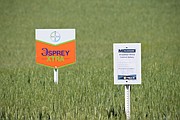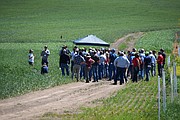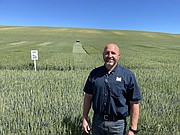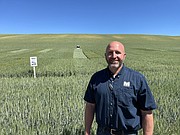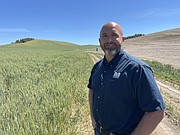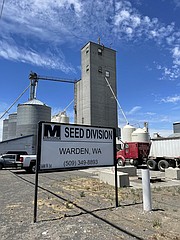Focusing on the region: McGregor aims to help Basin farmers make the most of their land
CHARLES H. FEATHERSTONE | Hagadone News Network | UPDATED 4 years, 4 months AGO
COLFAX — There was a definite trend visible during a recent drive east across the Columbia Basin.
While some of the dryland wheat fields in Adams County looked good ripening under the hot Basin sun, other fields looked scraggly, thin, even a little bit stunted.
“They’re saying this is our driest spring on record, or if not the driest then probably the second driest,” said Ryan Tippett, the director of product innovation for Colfax-based McGregor. “It’s been a long while since we’ve seen rain this year.”
However, as you drive east along state Route 26 from Othello through Washtucna and into the Palouse, the fields get greener, thicker, taller, thanks to an average of 20 inches of precipitation every year. The drought, which is hitting the entire western United States, is especially hard on dryland wheat farms in the Columbia Basin, which normally only get 7-10 inches of precipitation in a year, and have to hoard every drop of water to get a crop in without irrigating it.
“The nice thing about the Palouse is that it has a nice, deep soil profile to capture that moisture, whereas Adams County, in the lower Basin, it’s more of a sandbox,” Tippet said.
It’s not impossible to dry farm successfully in the Columbia Basin — generations of farmers have proven that. But it can be difficult.
As a full-service agronomy, seed and fertilizer company located entirely in the Pacific Northwest, McGregor, Tippett said, is well-placed to help farmers — especially those in the Columbia Basin — deal with the very specific soil and climate conditions they face.
The company, which employs around 440 people at 35 locations in Eastern Washington, northern Idaho and northeast Oregon, sells a full line of fertilizers, fungicides, seed care treatments, does research into seed varieties specifically tailored for local conditions, and provides a panoply of agronomic consulting services to help farmers plan for their specific circumstances, and even risk management services to help farmers find the best insurance deals for both personal and farm insurance.
“When I say full service, it means we can go out and do applications that the grower wants us to or if they have their own equipment we can do soil sampling, field scouting, fertility recommendations or crop protection recommendations,” Tippett said.
It’s a lot for a company started by Canadian brothers Archie, Peter and John McGregor, all of whom migrated to eastern Washington in the early 1880s looking for a place to raise sheep. Eventually, the family-owned company branched out into making fertilizer, and it’s that company — spun off in the mid-1950s — that formed the core of the still family-owned company today.
But the core of McGregor’s business remains dryland farming and helping dryland farmers succeed.
“We manufacture and develop a lot of our own products that are kind of localized or specialized for our region for this environment,” he said.
For example, Tippett highlighted M-Struct, a specially formulated seed coating of nitrogen and phosphorus McGregor created to help seeds put out roots better, and McGregor Rally, a urea-based nitrogen and nutrient mix specifically designed for farmers in the inland regions of the Pacific Northwest.
“It’s kind of unique to the region,” he said.
The company, however, has other specialized seed coatings that also help provide protection against diseases and insect pests, Tippett said.
In fact, the company runs a 350-acre research farm out by its headquarters near the Port of Whitman Business Air Center — the city’s airport — where it conducts its own tests on new strains of crops and new chemical treatments for seeds, as well as hosting trials and tests conducted by other companies and organizations.
It’s important to find varieties of crops, particularly those adapted to dryland conditions, that will work well in Eastern Washington. Varieties adapted to growing in places with ample summer rain are “like an irrigated crop,” Tippett said, and won’t grow very well in the semi-arid expanses of Eastern Washington.
“We do a lot a specialized research to make sure we have the right products for this region instead of just working off genetics from Europe or the Midwest,” Tippett said. “So we have to work on different genetics and different nutrient needs and load for that crop.”
McGregor has a five or six member research team at its research farm, Tippett said, and works closely with nearby Washington State University, Oregon State University, and private organizations to develop local varieties of winter and spring wheat.
“We’re also looking at garbanzos and canola as part of a crop rotation,” Tippett said. “In Pullman, and north of there, we’re looking at a three-year rotation. Winter wheat, then spring wheat, then a legume — lentils or chick peas or even canola. And back to wheat.”
It’s a rotation that won’t do well in the Columbia Basin, Tippett said, because not enough rain typically falls and the soil cannot capture enough moisture. For that research, Tippett said McGregor has test plots across the region, and growers in the Columbia Basin who help to develop varieties of wheat that will do well here, too.
“A variety that would do well in Adams County wouldn’t perform the same in the Palouse,” he said.
The research farm also gives McGregor the space to test how new varieties interact with new chemicals to see what the best combinations are for this region, Tippett said. The goal is to help grain grow bigger, better, faster and to withstand the heat and thrive in a region already known for being hot and dry in the summer.
“That helps our customers and our communities produce more on an acre in a more efficient manner,” Tippett said.
Charles H. Featherstone can be reached at [email protected].
ARTICLES BY CHARLES H. FEATHERSTONE

Potato prices up, sales down for first quarter 2023
DENVER — The value of grocery store potato sales rose 16% during the first three months of 2023 as the total volume of sales fell by 4.4%, according to a press release from PotatoesUSA, the national marketing board representing U.S. potato growers. The dollar value of all categories of U.S. potato products for the first quarter of 2023 was $4.2 billion, up from $3.6 billion for the first three months of 2022. However, the total volume of potato sales fell to 1.77 billion pounds in the first quarter of 2023 compared with 1.85 billion pounds during the same period of 2022, the press release noted. However, total grocery store potato sales for the first quarter of 2023 are still above the 1.74 billion pounds sold during the first three months of 2019 – a year before the outbreak of the COVID-19 pandemic, the press release said.

WSU Lind Dryland Research Station welcomes new director
LIND — Washington State University soil scientist and wheat breeder Mike Pumphrey was a bit dejected as he stood in front of some thin test squares of stunted, somewhat scraggly spring wheat at the university’s Lind Dryland Research Station. “As you can see, the spring wheat is having a pretty tough go of it this year,” he said. “It’s a little discouraging to stand in front of plots that are going to yield maybe about seven bushels per acre. Or something like that.” Barely two inches of rain have fallen at the station since the beginning of March, according to station records. Pumphrey, speaking to a crowd of wheat farmers, researchers, seed company representatives and students during the Lind Dryland Research Station’s annual field day on Thursday, June 15, said years like 2023 are a reminder that dryland farming is a gamble.

Wilson Creek hosts bluegrass gathering
WILSON CREEK — Bluegrass in the Park is set to start today at Wilson Creek City Park. The inaugural event is set to bring music and visitors to one of Grant County’s smallest towns. “I've been listening to bluegrass my whole life,” said the event’s organizer Shirley Billings, whose family band plays on their porch every year for the crowd at the Little Big Show. “My whole family plays bluegrass. And I just wanted to kind of get something for the community going. So I just invited all the people that I know and they’ll come and camp and jam.” ...








